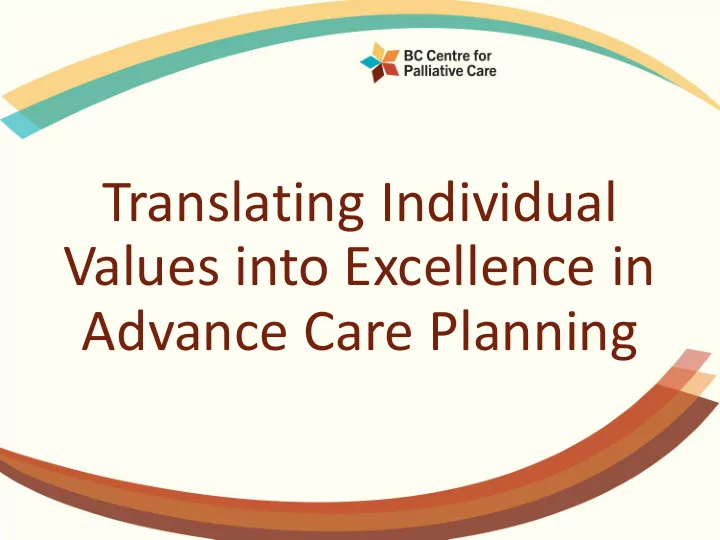

Translating Individual Values into Excellence in Advance Care Planning
Presenting today Doris Rachel Cari Pat Karen Barwich Carter Borenko Porterfield Sanderson Hoffmann
Presenter Disclosure Information No conflicts of interest
Advance Care Planning • A process where you think about and share your values, beliefs and wishes to support informed health-care decision making that can help you get care that’s right for you
How ACP influences care Advance Care Planning Goals of Care Conversations Your values, beliefs and wishes. Shared Understanding, Shared Decision Making. Advance Care Plan documented and shared. Decision about Substitute Decision Maker. Care Plan and Medical Orders
Poll Instructions • To participate, join the session by either: • Text • Join the session by sending a text message saying “ QF2017 ” to 37607 (just once) • Vote by sending your answer to 37607 • Web • Go to pollev.com/QF2017 • Any issues? Raise your hand
Have you done your ACP?
ACP In British Columbia 71% have thought about what matters most to them regarding their health care 27% have documented their wishes for their health care 49% have discussed this with their family 10% have discussed this with their health-care provider Data from a survey of 500 British Columbians, September 2016
Meet Catherine
Catherine’s ACP • Think about: • What gives her life meaning? • What would she want if she became unexpectedly unwell? • Who would be her substitute decision maker? • Conversations with family • Documentation • Organ donation
Catherine... 20 years later
Catherine’s ACP… 20 years later • Clarify understanding of illness with health-care provider • Review ACP • Wishes, including interventions • Substitute Decision Maker • Documentation • Conversations with family and health-care provider
Catherine …. another 5 years Catherine... another 5 years 13
Catherine’s ACP… another 5 years • Review ACP • Conversations with health-care provider: • Discuss illness, goals, fears/worries & priorities • Translating wishes into care plan • Advance Directive No-CPR & MOST • Conversations with family
Activity: Advance Care Planning • Part 1: Thinking. (2 min) On your own • Part 2: Sharing. (3 min) In pairs • Part 3: How did you find it? (5 min) Table discussion
Activity: Part 1 - Thinking (2 min) What are your values, beliefs and wishes with respect to health care?
Activity: Part 2 - Sharing In Pairs: (3 min) • Imagine you are speaking with your Substitute Decision Maker. • Try sharing what you just thought about. • How would you begin the conversation? • How would you share these thoughts?
Activity: Part 3 - How did you find it? Among your tables: • How did you find parts (5 min) 1 and 2 of the activity? • What most sticks out for you?
A Voice Not Heard
Patient-Centered Care Vision Principles Practices • Patients at the forefront of • Embed into • Dignity and Respect • Information Sharing their health & care Systems • Control over choices • Participation • (Advance Care • Informed decision making • Collaboration Planning) • Partnership • (Goals of care conversations) Drivers Health System Priorities Dimensions of Quality BC Patient-Centered Care Framework (2015) adaptation
Activity: Where are we now with respect to ACP influencing patient-centered care? Part 1: Discuss among your tables • What are we doing well? • What could we do better? (5 min)
Activity: Where are we now with respect to ACP influencing patient-centered care? Part 2: Share with the whole group • Send in the 5 keywords that best represent your conversation (words must be single words) (2 min)
What do you think of when you hear ACP in the context of patient-centered care?
Our Vision Support patient-centred care by improving the transition between Advance Care Planning and the care people receive.
Looking Forward…
Thank you for participating! ACP Day “What matters April 16 to you?” day June 6 For more information about our work come and visit our table in the foyer on the 3 rd floor
Recommend
More recommend